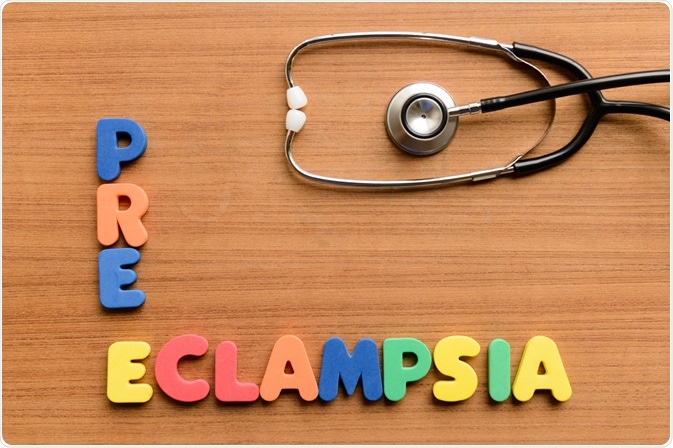Pre-eclampsia is a condition that affects around 5% of all pregnant women and can cause harm to both the mother and the unborn baby. This rapidly progressing condition is characterized by high blood pressure and the presence of protein in the urine. Affected women may also develop other symptoms such as sudden weight gain, headaches, swelling, abdominal pain, nausea, heartburn, fatigue and visual disturbances.
Pre-eclampsia usually develops some time during the middle to late pregnancy and can continue for up to six weeks after birth. In some rare cases, the condition develops before 20 weeks of gestation. The more severe the condition is, the greater the risk is to both mother and baby.

Image Credit: Sohel Parvez Haque / Shutterstock
Preeclampsia and other hypertensive conditions during pregnancy are a major cause of maternal and infant illness and fatality. Estimates suggest that worldwide these disorders account for around 76,000 maternal deaths and 500,000 infant deaths every year.
It is essential that pre-eclampsia is diagnosed and managed appropriately to prevent the condition from progressing to eclampsia, a life-threatening complication that puts the mother at risk of seizure, stroke and even falling into a coma.
Mild pre-eclampsia does not usually present with symptoms, but the condition is often detected during routine antenatal visits, so it is important for pregnant women to attend these appointments. As the condition progresses, symptoms may develop. The only way to cure pre-eclampsia is to give birth to the baby.
Cause
The exact cause of this condition is not fully understood. However, there are several hypotheses regarding the underlying pathology, which is known to involve a problem with the placenta.
During a healthy pregnancy, new blood vessels develop to ensure enough blood is sent to the placenta so that it can nourish the fetus. In pre-eclampsia, however, these blood vessels do not seem to develop properly, which limits the amount of oxygen and nutrients being transferred to the baby. The mother’s blood pressure also rises and eventually damages blood vessels in the kidneys, which then leak protein into the urine (proteinuria). The inadequate blood supply to the baby can affect their growth and development and babies born to mothers with the condition are often smaller than normal.
The reasons vascular abnormalities in the placenta arise are thought to include both genetic and environmental influences. Several genes are being researched for their involvement in preeclampsia and women are known to be at a greater risk of the illness if there is a family history of the condition. Factors such as diet, obesity and immune responses are also thought to play a role in the pathology. Some studies have demonstrated abnormal immune cell interactions in women with pre-eclampsia.
Risk factors
Although any pregnant woman can develop pre-eclampsia, certain factors are associated with an increased risk of developing the condition. These include:
- Age over 40 years or under 20 years (teenager)
- A previous history of pre-eclampsia or eclampsia
- Family history of pre-eclampsia
- Obesity
- High blood pressure prior to pregnancy
- Pregnancy using donor egg or semen
- The presence of diabetes, rheumatoid arthritis or systemic lupus erythematosus
- Pregnancy with twins or more multiples
- First pregnancy
Pre-eclampsia prevention
Some studies suggest that regular, low-dose aspirin may help to prevent pre-eclampsia in women who are at an increased risk of the condition. The National Institute for Health and Clinical Excellence (NICE) suggests that women who are at an increased risk take 75 mg aspirin every day from 12 weeks of pregnancy until the baby is delivered.
Further Reading
Last Updated: Feb 25, 2023